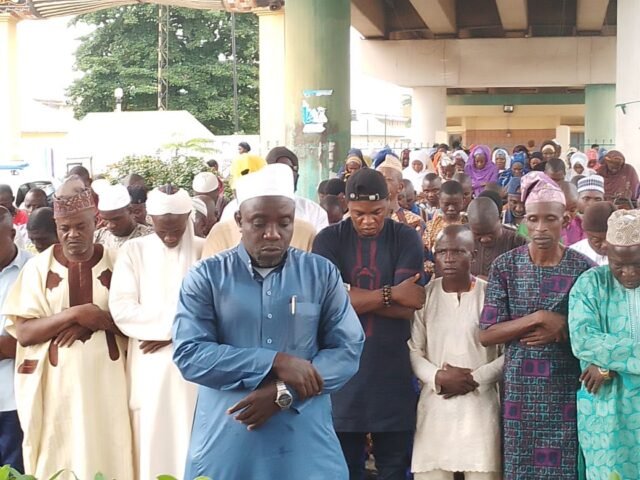Of all the 36 states of the federation, Oyo is probably the least likely to have its workers throw caution to the wind, protest, demonstrate, or revolt against the establishment. The reasons are not far-fetched. Rising from the ruins of late Abiola Ajimobi’s inconsistent salary and pension payment to the hefty bosom of Governor Seyi Makinde’s promise of a new dawn (Omituntun), the state workers, for the large part of the last four years, were in Eldorado! They practically had a remarkable moment collecting their entitlements, smiling cheerfully to the banks every 25th of every month. In addition to being timely and promptly paid, workers were also treated with an extra ‘jara’ what we might call a freebie, aka a ‘13-month’ salary, a sharp reminder of the glorious years of the late Abiola Ajimobi.
In his first term (2011–2015), the late Ajimobi paid workers a 13th-month salary as part of improving their lives while motivating them extrinsically. For most workers in the state, that era was not only divine but golden. In part because none of the previous administrations had prioritised workers’ welfare and well-being with such commitment. Unfortunately, Governor Ajimobi and his beloved servants would eventually roll in the mud of abuse and insults, throwing darts and dirt at each other until politicians like Governor Seyi Makinde exploited their avoidable public fiasco to their advantage. On several campaign trails in 2019, Governor Makinde promised to right the wrongs of the workers and pensioners and take care of their needs, and in 2023, he promised to consolidate what he has built. People bought into his compelling craft. The reward for this was his triumphant victory in 2019 and the renewal of his term in office for another four years.
But like every sweet, delightful, and pleasant honeymoon, an end must come and reality must set in. Enduringly, it took four years for that romantic relationship between the state and its band of workers to hit rock bottom. Strangely, nobody saw that looming breakup coming until the strain and the stain in their wholesome relationship became apparent even for the tired public to see. First, workers shun their work and then shut down their place of work, the secretariat. That was on the 31st of July, 2023. In essence, most workers consider that daring, bold, and decisive demonstration a crucial turning point—a clear message of ‘enough is enough’ to the government that’s unashamed to admit they’ve only “deducted their worker’s salary for three months”. Whereas most state workers across the federation have grown weary and continue to groan under biting and excruciating socio-economic reality, their counterparts in Oyo have for the past four years maintained a stoic silence, choosing instead to wear a dignifying poise while suffering under the duvet of propaganda, state capture, and unfavourable public opinion.
“No more suffering”. Reads one of the numerous inscriptions etched on a piece of cardboard hanging on the protest vehicle. Others were more confrontational and direct. Citing the skyrocketing cost of living, another demonstrator thundered that their full salary is no longer enough for their transportation to their places of work. It seems the cat has been let out of the bag, and the chicken, as they say, has finally come home to roast. But the peaceful demonstration wasn’t entirely about the deduction of salary or a reflection of gruelling socio-economic hardship; for one, it was an attempt for the workers to establish direct communication with the Governor. Up until that demonstration and protest, workers had to interact with the government through established official channels.
Titilola-Sodo, a former labour union leader turned SA to the Governor on labour matters, has been handling the delicate job of mediating between the government and the workers with practised confidence. He has held that position for the past couple of years, and given the smooth, rancour-free, and cordial working relationship that permeated much of the Governor’s first tenure, his reappointment was one of the most anticipated. But now, that Midas touch and the magic wand that have helped Mr Sodo carve a niche for himself with his former comrades seem to have hit a brick wall.
Perhaps the five days of protest and demonstration by the state workers are a reflection of the system that is haemorrhaging. For the last four years, it was foolproof, but now it is bleeding. The fact that the workers went on with the protest underscores the profoundness of their agitation. And for the Governor to have avoided them despite repeated calls shows all is not well with the two entities. But that is not the whole gist. While some states of the federation, like Bornu, Lagos, and Kwara, have been proactive in rolling out palliatives to their people, in Oyo, the exercise has dragged on. In Kwara, for instance, Governor Abdulrahman Abdulrazaq was quick to announce a motley crew of interventions to cushion the effects of subsidy removal. First, his government announced the reduction of workdays from five to three. That decision was well received by workers, who are already gritting their teeth at the high cost of transportation.
Similarly, the NGF chairman equally rolled out a multi-billion-naira palliative in addition to the 10K pegged for students of Kwara origin. Many in the state are excited that a government is in place that cares about the people. In Lagos, the state government has shown a remarkable commitment to helping the vulnerable members of society survive the aftermath of the current socioeconomic crisis. Apart from slashing the transport fare, a far-reaching step, the state government under Babajide Sanwoolu has also promised to make more buses available for state workers to ease their movement from home to work. You can imagine the sense of belonging that will permeate those states, especially among the workers who seem to be among the affected. As far away as Bornu, Governor Babangida Zulum has equally rolled out different measures aimed at cushioning the effects of subsidy removal. Among the various palliatives is one targeting about 300,000 households with about six people per household to reach one million and eight hundred thousand people in need.
In Oyo, nobody knows when the state government’s palliatives will be rolled out. Last month, a memo with the letterhead paper of the committee set up on palliative care purportedly leaked. The content of the memo detailed measures the government should take to reduce the pang of subsidy removal, especially for workers who have had to bear much of the brunt. The memo was dismissed immediately after it was leaked.
Consequently, the backlash that followed has given the government a jolt of inconvenience. But whether comfortable or not with the workers’ reactions, the cracks are undeniably visible and palpable. Once the darling of workers, Governor Makinde’s one week of silence and indifference is telling. Described as worker-friendly, shey Na, like this Makinde’s sweet and romantic relationship with workers go heartbreakingly scatter? Too early to say!
OYO101 is Muftau Gbadegesin’s opinion about Issues affecting Oyo state, published on Saturdays. He can be reached via @TheGMAKing on Twitter, muftaugbadegesin@gmail.com and 09065176850

































